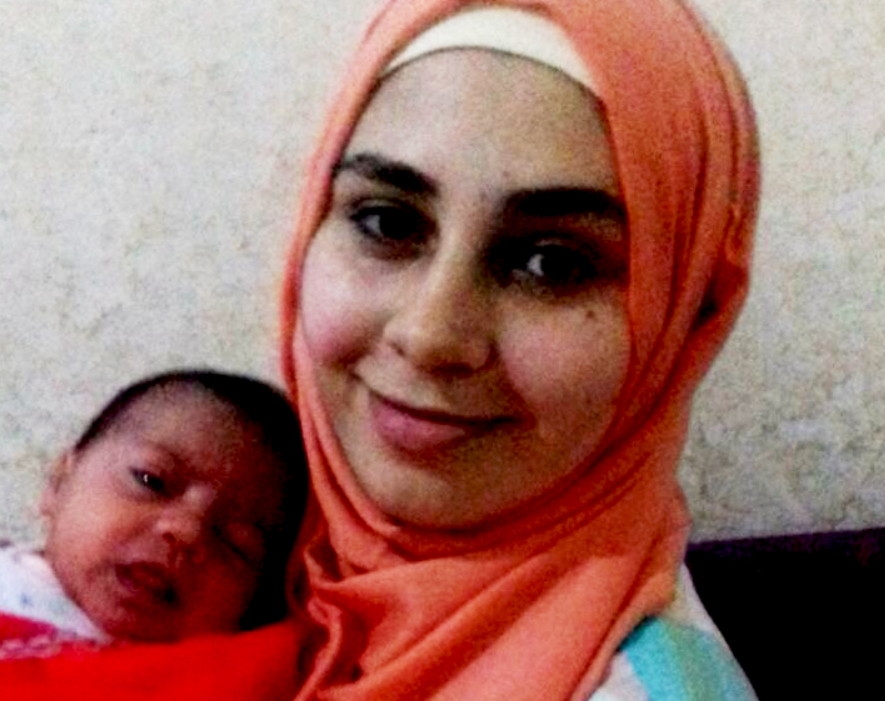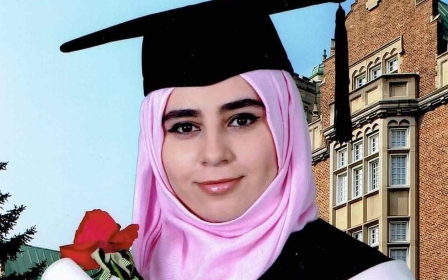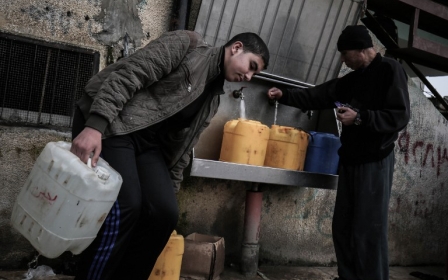Canadian forced to give birth in Gaza still fighting to get home

MONTREAL, Canada – The family of a Canadian woman who was forced to give birth in the Gaza Strip earlier this month is calling on Ottawa to intervene to bring her and her newborn daughter home.
Bissan Eid, 24, gave birth to her first child, Sarah, on May 11 in Khan Younis in southern Gaza, several months after she first attempted to leave the beseiged coastal Palestinian territory.
“We are worried about Bissan,” her father, Hadi Eid, told Middle East Eye on Friday.
“We are worried about her health, about her baby’s health. We need our daughter [to] come back and live a normal life here with us.”
A Canadian citizen whose family is Palestinian from the Gaza Strip, Bissan first went to Gaza in June 2016 to get married and visit relatives.
But when she tried to leave, Israel did not grant her a permit to exit Gaza through the Erez border crossing it controls. From there, Bissan had planned to travel to Jordan and fly to Canada.
We need the Canadian government not to discriminate [against] Bissan because of her place of birth, because she’s Palestinian and she’s from Gaza
- Hadi Eid, Bissan's father
After it became clear she would not be allowed to leave, Bissan was forced to give birth in Gaza.
A crippling Israeli-Egyptian blockade has led to daily power outages, a lack of medicine and other resources, and strict restrictions on freedom of movement in and out of the territory.
The local medical system is under severe strain, and hospitals struggle to meet residents’ needs.
While Bissan had an assisted delivery, her daughter was born healthy, Eid said.
But her protracted struggle to get back to Canada has left her feeling frustrated and alone, her father said.
“She feels so pressured. She’s waiting, waiting, waiting, and she gets frustrated all the time [by] the Canadian government. She feels like she’s left alone in Gaza and no one is asking about her,” Eid said.
The situation also caused Bissan to miss the entire second year in a master’s degree she was pursuing in civil engineering at Concordia University in Montreal.
The Concordia Student Union issued a public call last month for Canadian lawmakers to do more to bring Bissan back, and a petition to that effect has garnered more than 1,350 signatures to date.
‘Treat her as a Canadian’
Originally from Gaza, Eid came to Canada in 2000, and received Canadian citizenship four years later. His family members, including Bissan, were granted Canadian citizenship in 2005.
Eid said the Canadian representative office in Ramallah, which provides consular services in the occupied Palestinian territories, had pledged to help Bissan leave Gaza after her baby was born.
But Eid said the office recently told Bissan that she needed to secure permits for herself and her daughter to enter Jordan, before she would be able to leave Gaza.
“This complicated the situation because to get permission [for] the baby, she needed to make a Palestinian passport,” he said, adding that Bissan also applied for a Canadian passport for her daughter.
He said the situation raises a question as to why Bissan and her daughter, who are Canadian citizens, need visas in advance to enter Jordan, while that is not a requirement for all Canadians.
“Canadians don’t need permission to go to Jordan. They get the visa at the airport… If any Canadian can go to Jordan without a visa, why [do] Bissan and her baby need a visa?” Eid asked.
The Canadian government, he concluded, has shown in his daughter’s case that it “approves [of] the discrimination against Palestinians” exhibited by both the Jordanian and Israeli authorities.
A spokesperson for Global Affairs Canada said the department “is aware that a Canadian Citizen is seeking assistance to depart Gaza”.
“Consular officials are assisting the individual and providing updated information on how to leave the region,” Kristine Racicot told MEE in a brief emailed statement.
A spokesperson for Immigration, Refugees and Citizenship Canada said the department could not divulge any specifics about the case without a consent form signed by Bissan.
Meanwhile, Eid said he has not been contacted directly by any officials in Canada, adding that his family feels abandoned.
“We need the Canadian government to treat her as a Canadian,” Eid said.
“We need the Canadian government not to discriminate [against] Bissan because of her place of birth, because she’s Palestinian and she’s from Gaza.”
Middle East Eye propose une couverture et une analyse indépendantes et incomparables du Moyen-Orient, de l’Afrique du Nord et d’autres régions du monde. Pour en savoir plus sur la reprise de ce contenu et les frais qui s’appliquent, veuillez remplir ce formulaire [en anglais]. Pour en savoir plus sur MEE, cliquez ici [en anglais].




